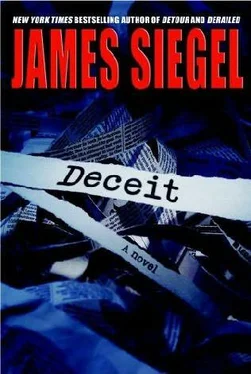Once there were two villages. One village where they always told the truth. Another village where they always lied. One day a traveler came to a fork in the road. He knew one road led to the village where they always told the truth. In this village he would find food and shelter. The other road led to the village where everyone lied. In that village he knew he’d be beaten, robbed, even killed. A man stood at the fork in this road, but the traveler didn’t know which village this man came from. The one where they always told the truth, or the one where they always lied? “You can ask me one question,” the man said. “Just one.” The traveler thought and pondered and finally he knew which question to ask. He pointed to the left road and said: “Is this the road to your village?” “Yes,” the man answered him. The traveler nodded, said thank you, and started down the road. He knew if he was addressing a man from the village where they always told the truth, then it was of course the road to the right village. And if he were addressing someone from the village of liars, then the man would have to lie and say yes as well. Whether the man was the liar or the truth-teller, he would give exactly the same answer.
I am writing this as fast as I can.
I am galloping through hostile territory like the Pony Express, because I absolutely must deliver the mail.
I’ve already taken my fair share of arrows. And though I’m clearly wounded, I’m not dead.
Not yet.
I’m trying mightily to remember everything germane.
I’m a bit shaky on the timeline, on the cause and effects. On specificity.
I am freely and honestly admitting to this. Just so when all the little editors begin flourishing their red pencils, and they will, I’ll have hopefully, if only momentarily, dulled the momentum of their onrushing venom.
I don’t blame them. I truly don’t.
I am, after all, the boy who cried wolf. Who shouted, screamed, and plastered it across two-inch headlines.
Mea culpa.
All I can tell you is that what I’m writing in this claustrophobic motel room is the absolute, unvarnished, 100 percent truth.
So help me God. Scout’s honor. Cross my heart and hope to die.
Change hope to expect.
This isn’t just my last story.
It’s my last will and testament.
Pay attention.
You are my executor.
One brief digression.
Writing my last story, I can’t help but remember my first.
I was 9.
It was snowing. Not the paltry dusting that generally passed for snow in Queens, New York. No, the sky was actually dumping snow, as if someone had loosened a giant saltshaker top up there. Icicles were being blown off our sagging gutters and straight into the brick walls of the house, where they splintered with the sound of ball meeting bat.
Schools would be closed all week.
My brother Jimmy slipped on the ice and he hit his head, I wrote on neatly lined composition paper. He is always falling down and stuff like that. He walked into a door and he got a black eye. Last week he fell down in the tub, and he burnt himself. He is really clumsy and my mom keeps telling him to watch where he’s going, but he don’t listen. He is only 6.
I brought the story into the kitchen where my mother was slumped over the table, staring into an empty bottle of Johnnie Walker.
“Read it to me,” she slurred.
After I finished, she said: “Okay, good. I want you to memorize it. They’ll be here in an hour.”
There were no storm warnings.
No emergency disaster center urging me to board up the windows and leave town.
I can look back to that day, borrow a cliche (I apologize to my first journalism professor, who abhorred cliches as much as he abhorred the newly instituted no-fraternization-with-coeds rule), and state that with the exception of Belinda Washington turning 100, absolutely nothing that day was out of the ordinary. Ordinary, after all, was pretty much the daily state of affairs in Littleton, California-approximately 153 miles east of L.A.
Change approximately to exactly.
Two years ago I’d driven every mile of it in my last certifiably owned possession-a silver-blue Miata, purchased back when Miatas were hot shit. A case could be made that back then I was, too.
Now the Miata was ignobly dented in two separate places, with a sluggish transmission that complained loudly when asked to change gears.
On the morning in question, I was summoned into Hinch’s office and told to cover Belinda Washington’s centennial. Clearly a human-interest piece. You could safely state that every article in the Littleton Journal was a human-interest piece. It went to press only five times a week-sometimes less, if not enough local news had taken place since the previous issue. The only serious news stories that made it into the town’s paper were picked up from the AP, stories that came from places like Baghdad and Kabul, where you could almost smell the cordite emanating off the type. I perused them longingly, as if they were dirty French postcards from a long-ago era.
Belinda Washington was from a long-ago era.
You could intuit that from the wheelchair and her nearly bald pate. When I entered the dayroom of Littleton’s only senior citizen home, she was wearing a ridiculous paper tiara with the number 100 printed on it. It was obviously someone’s idea of cute. Probably not Belinda’s. She didn’t look happy as much as bewildered. I dutifully maintained my objectivity and resisted the urge to knock it off her head.
These days, I was strictly adhering to the noble tenets of my profession.
I introduced myself to the managing director of the home, a Mr. Birdwell, who was orchestrating the august occasion with the aid of a digital camera. Good. That would save me from having to snap any pictures. On the Littleton Journal , we multitasked.
I kneeled down in front of Belinda and introduced myself in a louder-than-normal voice.
“Hello, Mrs. Washington. Tom Valle from the Littleton Journal. ”
“What you shouting for?” Belinda asked, grimacing. Evidently, Belinda wasn’t any fonder of patronizing reporters than she was of paper tiaras.
“Take that thing off my head,” she added.
“Gladly.” I stood up and removed the tiara, handing it to one of the male attendants who looked personally miffed that I’d intruded on their fun.
“That’s better,” Belinda said.
“Sure,” I said. “Well, happy birthday, Mrs. Washington. What’s it like to be 100 years old?”
“What you think it’s like?” she said.
“I don’t know.”
“More fun turning 18.”
“That would’ve been… what, 1920 something?”
“’22.”
“Right. Math was my worst subject.”
“Not me. I’m good at it.”
I’d expected to be interviewing a drooling apparition. So far, the only one doing any drooling was myself. One of the partygoers was kind of attractive. Auburn-haired, 30-ish, seamlessly fitted into lime green capris and precariously perched on three-inch heels. There were moments I thought my drooling days were past me-not because of my age (nudging 40) but just because everything was past me-all the good stuff, and didn’t women constitute good?
Belinda lifted a skeletal hand.
“I miss things,” she said.
For a moment, I thought she was referring to the general bane of old age, things getting past her: conversations, names, dates.
She wasn’t. She was referring to that other bane of old age.
“People have gone and died on me,” she said. And she smiled, half wistfully, but half, I think, because she was flirting with me.
Читать дальше












